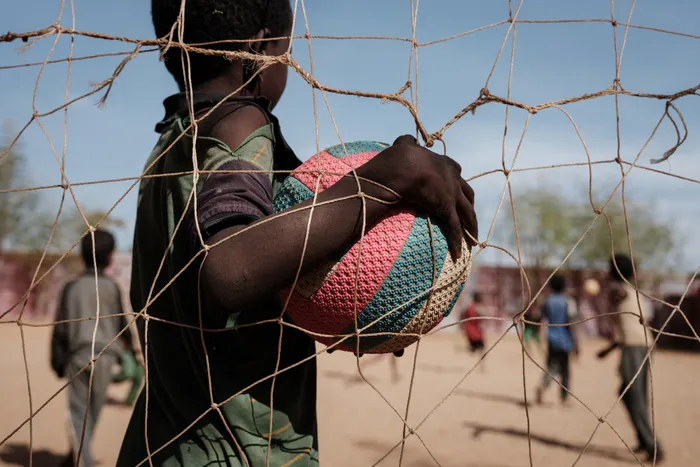Securing Somalia’s security a priority in the wake of UN exit

Children play football in a playground installed by the NGO Save The Children at Garas Goof camp, one of the 500 camps for internally displaced persons (IDPs) in town, in Baidoa, Somalia. Desperate, hungry and thirsty, more and more people are flocking to Baidoa from rural areas of southern Somalia, one of the regions hardest hit by the drought that is engulfing the Horn of Africa. – Picture: Yasuyoshi Chiba / AFP / Taken February 14, 2022
By Sizo Nkala
Following the collapse of the state and the ousting of Siad Barre in 1991, Somalia has been embroiled in intractable conflict which has evolved from clan warfare to terrorist insurgency over the past 33 years.
The country’s security architecture, which has been dominated by various foreign interventions since 1991, is set to undergo a major transformation at the end of 2024. The UN-backed AU Mission in Somalia, which ventured into Somalia in 2007 and was renamed the AU Transition Mission in Somalia (Atmis), is set to wind up its activities and withdraw from Somalia by end of December 2024, following a request by the Somalian government in 2022.
The Atmis withdrawal process is in motion, with 5 000 troops of a total 17 500 having left the country in two phases. The first phase was finalised in June 2023 which saw 2 000 troops leave the country. A further 3 000 soldiers left after the conclusion of the second phase in January.
Under this phase, Atmis also handed over the nine military bases to the Somalian army. About 4 000 Atmis troops will leave Somalia in June at the conclusion of the third phase while the rest of the troops will leave by December.
Atmis has played a crucial role in helping Somalian government forces fight the al-Qaeda-linked al-Shabaab insurgents, who reportedly control half of the Somalian territory and boast significant manpower. There have been worries that the withdrawal of Atmis will leave a security vacuum that will lead to the insurgents gaining lost territory.
The aim of every peacekeeping mission is to hold the fort until a peace agreement is signed between the belligerents. However, Atmis leaves without any peace agreement in place and having failed to contain the al-Shabaab.
However, the AU troops were facing formidable challenges which undermined their effectiveness in the fight against the insurgents.
The Atmis forces were spread over 70 operating bases, which meant they had to spread themselves thinly over a vast area, making it difficult to maintain offensives against the al-Shabaab forces.
The dispersed force posture of the Atmis forces gave the insurgents some room to ambush and unleash deadly attacks on the Atmis and Somali forces. Moreover, the distribution of the troops over a large area undermined the security of supply routes and made logistics more expensive.
Financing has been another issue. The Atmis troops receive a monthly stipend of $800 (about R14 500), which is below the UN peacekeeping standard rate of $1 028. This has negatively affected the morale of the AU peacekeepers. As such, Atmis was presenting a financial headache for the AU and its partners, while its effectiveness on the front lines was rapidly waning.
Hence its withdrawal will allow the Somalian government to implement its Security Sector Development Plan, which was launched by President Hassan Sheikh Mohamad in December 2023 and endorsed by various partners, among them the AU, the UN, the EU, Qatar, Saudi Arabia, Türkiye, the United Arab Emirates, Britain and the US.
Among the key objectives of the plan is the establishment of capable, accountable, affordable and transparent security forces and institutions. The plan would be strengthened by the lifting of the 31-year arms embargo on Somalia by the UN Security Council last year.
The government would be able to equip its military, thus enabling it to effectively combat the insurgents and also maintain the gains it has made.
Moreover, Somalia recently joined the East African Community as its eighth member. Its membership in the regional body will enable it to tap into the resources of the Eastern Africa Standby Force to combat al-Shabaab.
However, a successful outcome is far from assured since Somalia is reconstructing its army, which has significant logistical, financial and ideological deficiencies. It is not helping that al-Shabaab reportedly has sympathisers within the Somalian military and government, which could greatly undermine any counterinsurgency operations.
In another development that will alter the country’s security framework, the Somalian government expressed its intention to end the mandate of the UN Assistance Mission in Somalia, aka Unsom, through a letter sent by its foreign ministry to the UN Security Council on May 5.
The country’s foreign minister, Ahmed Moalim Fiqi, requested the mission to wind up its activities in preparation for the discontinuation of its mandate which was set to expire at the end of October this year.
The Unsom was set up by the Security Council in 2013 to facilitate the peace and reconciliation processes and to provide policy and strategic advice to the AU peacekeeping mission and the Somalian government.
The withdrawal of the Unsom is part of an initiative by Somalia to claim ownership of its security programmes.
However, it is not clear whether the country’s institutions have the capacity to drive an effective security policy.
Dr Sizo Nkala Research Fellow at the University of Johannesburg’s Centre for Africa-China Studies
Related Topics: